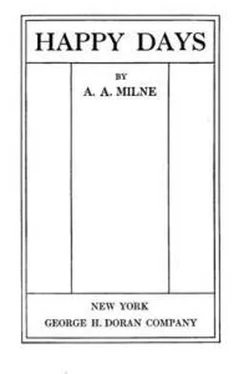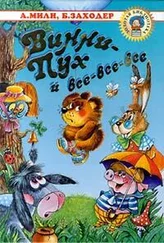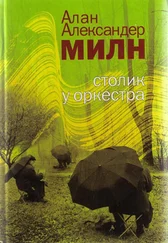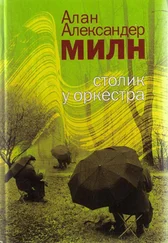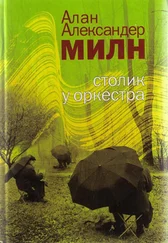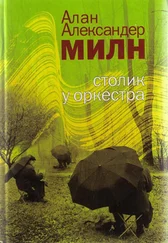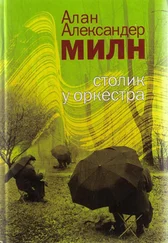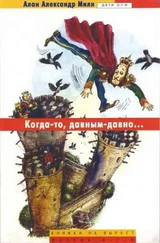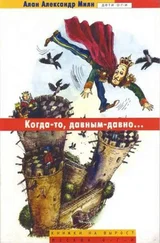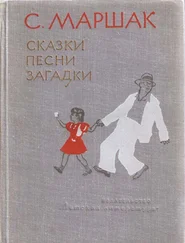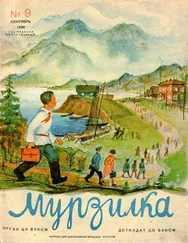Алан Милн - Happy Days
Здесь есть возможность читать онлайн «Алан Милн - Happy Days» весь текст электронной книги совершенно бесплатно (целиком полную версию без сокращений). В некоторых случаях можно слушать аудио, скачать через торрент в формате fb2 и присутствует краткое содержание. Год выпуска: 2014, Издательство: epubBooks Classics, Жанр: Юмористическая проза, на английском языке. Описание произведения, (предисловие) а так же отзывы посетителей доступны на портале библиотеки ЛибКат.
- Название:Happy Days
- Автор:
- Издательство:epubBooks Classics
- Жанр:
- Год:2014
- ISBN:нет данных
- Рейтинг книги:5 / 5. Голосов: 1
-
Избранное:Добавить в избранное
- Отзывы:
-
Ваша оценка:
- 100
- 1
- 2
- 3
- 4
- 5
Happy Days: краткое содержание, описание и аннотация
Предлагаем к чтению аннотацию, описание, краткое содержание или предисловие (зависит от того, что написал сам автор книги «Happy Days»). Если вы не нашли необходимую информацию о книге — напишите в комментариях, мы постараемся отыскать её.
Happy Days — читать онлайн бесплатно полную книгу (весь текст) целиком
Ниже представлен текст книги, разбитый по страницам. Система сохранения места последней прочитанной страницы, позволяет с удобством читать онлайн бесплатно книгу «Happy Days», без необходимости каждый раз заново искать на чём Вы остановились. Поставьте закладку, и сможете в любой момент перейти на страницу, на которой закончили чтение.
Интервал:
Закладка:
I
Dear Thankyou ,—I've some wonderful news for you! Guess what it is; but no, you never will. Well, I'll tell you. I can walk! Really and really.
It is most awfully interesting. You put one foot out to the right, and then you bring the left after it. That's one walk, and I have done seven altogether. You have to keep your hands out in front of you, so as to balance properly. That's all the rules—the rest is just knack. I got it quite suddenly. It is such fun; I wake up about five every morning now, thinking of it.
Of course I fall down now and then. You see, I'm only beginning. When I fall, Mother comes and picks me up. That reminds me, I don't want you to call me "Baby" any more now I can walk. Babies can't walk, they just get carried about and put in perambulators. I was given a lot of names a long time ago, but I forget what they were. I think one was rather silly, like Margery, but I have never had it used lately. Mother always calls me O. D. now.
Good–bye. Write directly you get this.
Your loving,
O. D.
II
My Dear O. D. ,—I was so glad to get your letter, because I was just going to write to you. What do you think? No, you'll never guess—shall I tell you?—no—yes—no; well, I've bought a pianola!
It's really rather difficult to play it properly. I know people like Paderewski and—I can only think of Paderewski for the moment, I know that sort of person doesn't think much of the pianola artist; but they are quite wrong about it all. The mechanical agility with the fingers is nothing, the soul is everything. Now you can get the soul, the con molto expressione feeling, just as well in the pianola as in the piano. Of course you have to keep a sharp eye on the music. Some people roll it off just like a barrel–organ; but when I see Allegro or Andante or anything of that kind on the score, I'm on it like a bird.
No time for more now, as I've just got a new lot of music in.
Your loving,
~Thankyou.~
P. S.—When are you coming to hear me play? I did "Mumbling Mose" just now, with one hand and lots of soul.
(Signed) ~Paderewski.~
P. P. S.—I am glad you can walk.
III
Dear Thankyou ,—I am rather upset about my walking. You remember I told you I had done seven in my last? Well, this morning I couldn't do a single one! Well, I did do one, as a matter of fact, but I suppose some people would say it didn't count, because I fell down directly after, though I don't see that that matters,—do you, Thankyou? But even with that one it was only one, and yet I know I did seven the day before. I wonder why it is. I do it the right way, I'm sure, and I keep my hands out so as to balance, so perhaps it's the shoes that are wrong. I must ask Mother to get me a new pair, and tell the man they're for walks.
Now do write me a nice long letter, Thankyou, because I feel very miserable about this. It is right, isn't it, when you have the right leg out, only to bring the left one just up to it, and not beyond? And does it matter which foot you start with? Let me know quickly, because Father is coming home to–morrow and I want to show him.
Your loving,
O. D.
P. S.—I am glad you like your pianola
IV
Dear O. D. ,—Very glad to get yours. If you really want a long letter, you shall have one; only I warn you that if once I begin nothing less than any earthquake can stop me. Well, first, then, I played the Merry Widow Waltz yesterday to Mrs. Polacca, who is a great authority on music, and in with all the Queen's Hall set, and she said that my touch reminded her of—I've forgotten the man's name now, which is rather sickening, because it spoils the story a bit, but he was one of the real tiptoppers who makes hundreds a week, and well, that was the sort of man I reminded her of. If I can do that with a waltz, it stands to reason that with something classic there'd be no holding me. I think I shall give a recital. Tickets 10/6d. No free seats. No emergency exit. It is a great mistake to have an emergency exit at a recital.
( Three pages omitted. )
Really, O. D., you must hear me doing the double F in the Boston Cake Walk to get me at my best. You've heard Kubelik on the violin? Well, it's not a bit like that, and yet there's just the something which links great artists together, no matter what their medium of expression.
Your loving,
~Thankyou.~
P. S.—Glad you're getting on so well with your walking.
V
Dearest Thankyou ,—Hooray, hooray, hooray—I did twenty–five walks to–day! Father counted. He says my style reminds him of " Cancer Vulgaris " rather. How many times can he do it? Not twenty–five on the third day, I'm sure.
Isn't it splendid of me? I see now where I was wrong yesterday. I got the knack again suddenly this morning, and I'm all right now. To–morrow I shall walk round the table. It is a longish way and there are four turns, which I am not sure about. How do you turn? I suppose you put the right hand out?
Your very loving,
O. D.
VI
Dear O. D. ,—I am rather hurt by your letters. I have written several times to tell you all about my new pianola, and you don't seem to take any interest at all. I was going to have told you this time that the man in the flat below had sent me a note, just as if it had been a real piano. He says he doesn't mind my playing all day, so long as I don't start before eight in the morning, as he is in his bath then, and in listening to the music quite forgets to come out sometimes, which I can see might be very awkward.
Write to yours affectionately,
~Thankyou.~
VII
Darling Thankyou ,—I am so sorry, dear, and I will come and hear your pianola to–morrow, and I think it lovely, and you must be clever to play it so well; but you musn't be angry with me because I am so taken up with my walking. You see, it is all so new to me. I feel as though I want everybody to know all about it.
Your pianola must be lovely, Thankyou. Dear Thankyou, could you, do you think, put all the letters we wrote to each other about my walking in some book, so that other people would know how to do it the way I do? You might call it "Letters on Walking," or "How to Walk," or—but you could get a better title than I could. Do!
Your very loving,
O. D.
P. S.—I'm so glad about the pianola and do you mind if I just tell you that I did walk round the table, corners and all?
VIII
Dearest O. D. ,—Right you are. I will think of a good title.
Your loving,
~Thankyou.~
III
The Knight of the Chimney-piece
We don't know his real name, but we have decided to call him "Arthur" ("Sir Arthur," I suppose he would be). He stands in bronze upon the chimney–piece, and in his right hand is a javelin; this makes him a very dangerous person. Opposite him, but behind the clock (Coward!), stands the other fellow, similarly armed. Most people imagine that the two are fighting for the hand of the lady on the clock, and they aver that they can hear her heart beating with the excitement of it; but, to let you into the secret, the other fellow doesn't come into the story at all. Only Margery and I know the true story. I think I told it to her one night when she wouldn't go to sleep—or perhaps she told it to me.
The best of this tale (I say it as the possible author) is that it is modern. It were easy to have invented something more in keeping with the knight's armour, but we had to remember that this was the twentieth century, and that here in this twentieth century was Sir Arthur on the chimney–piece, with his javelin drawn back. For whom is he waiting?
Читать дальшеИнтервал:
Закладка:
Похожие книги на «Happy Days»
Представляем Вашему вниманию похожие книги на «Happy Days» списком для выбора. Мы отобрали схожую по названию и смыслу литературу в надежде предоставить читателям больше вариантов отыскать новые, интересные, ещё непрочитанные произведения.
Обсуждение, отзывы о книге «Happy Days» и просто собственные мнения читателей. Оставьте ваши комментарии, напишите, что Вы думаете о произведении, его смысле или главных героях. Укажите что конкретно понравилось, а что нет, и почему Вы так считаете.
